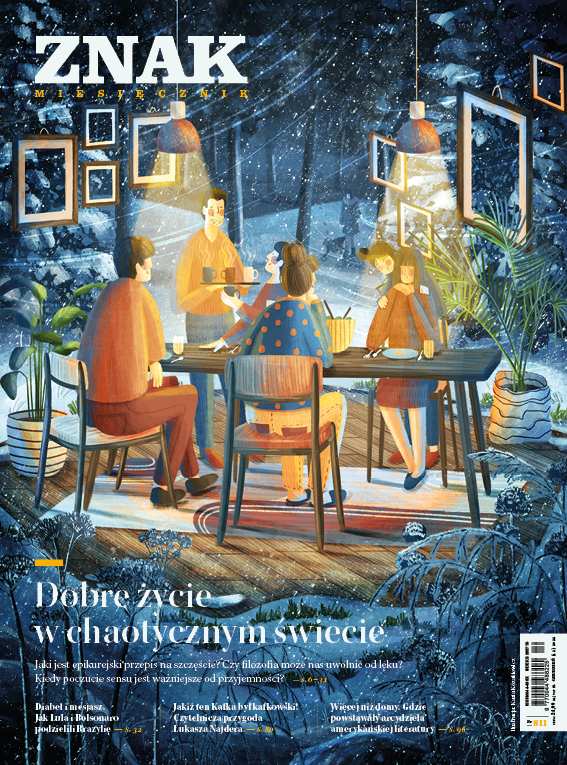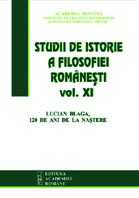
We kindly inform you that, as long as the subject affiliation of our 300.000+ articles is in progress, you might get unsufficient or no results on your third level or second level search. In this case, please broaden your search criteria.

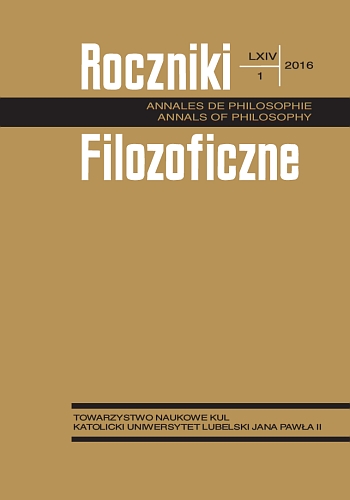
One of the philosophical problems that developed on the basis of Aristotle’s philosophy of nature is the debate on “nature and art.” The formation of the experimental viewpoint which influenced the philosophical discussion and its criteria for distinguishing products of nature and products of art are also proposed as part of this debate. The purpose of this article is to elaborate on how the arguments surrounding “nature and art” influenced the experimental design of Robert Boyle’s philosophy of naturalism and the philosophical assumptions of modern experimentalism.
More...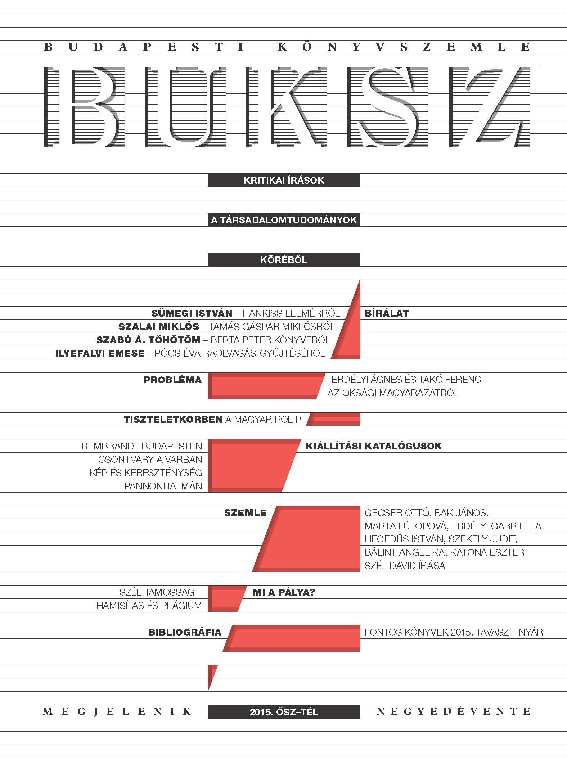
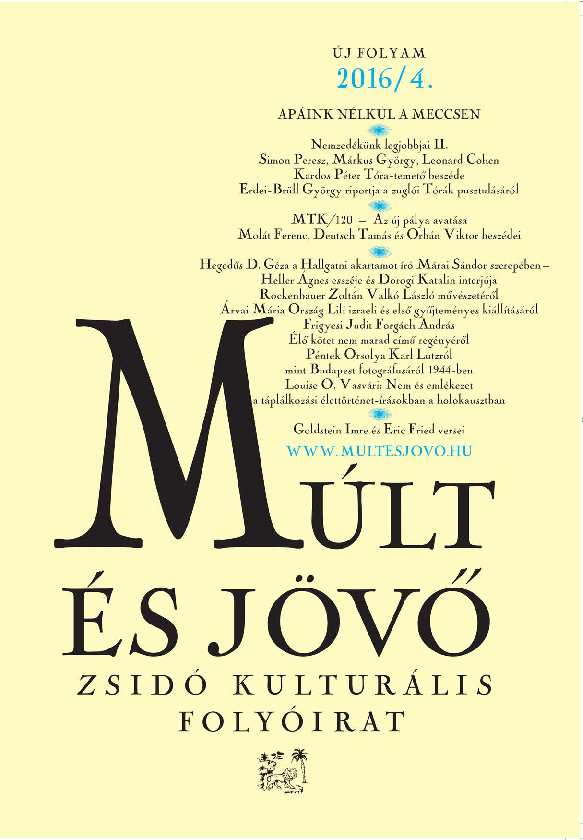
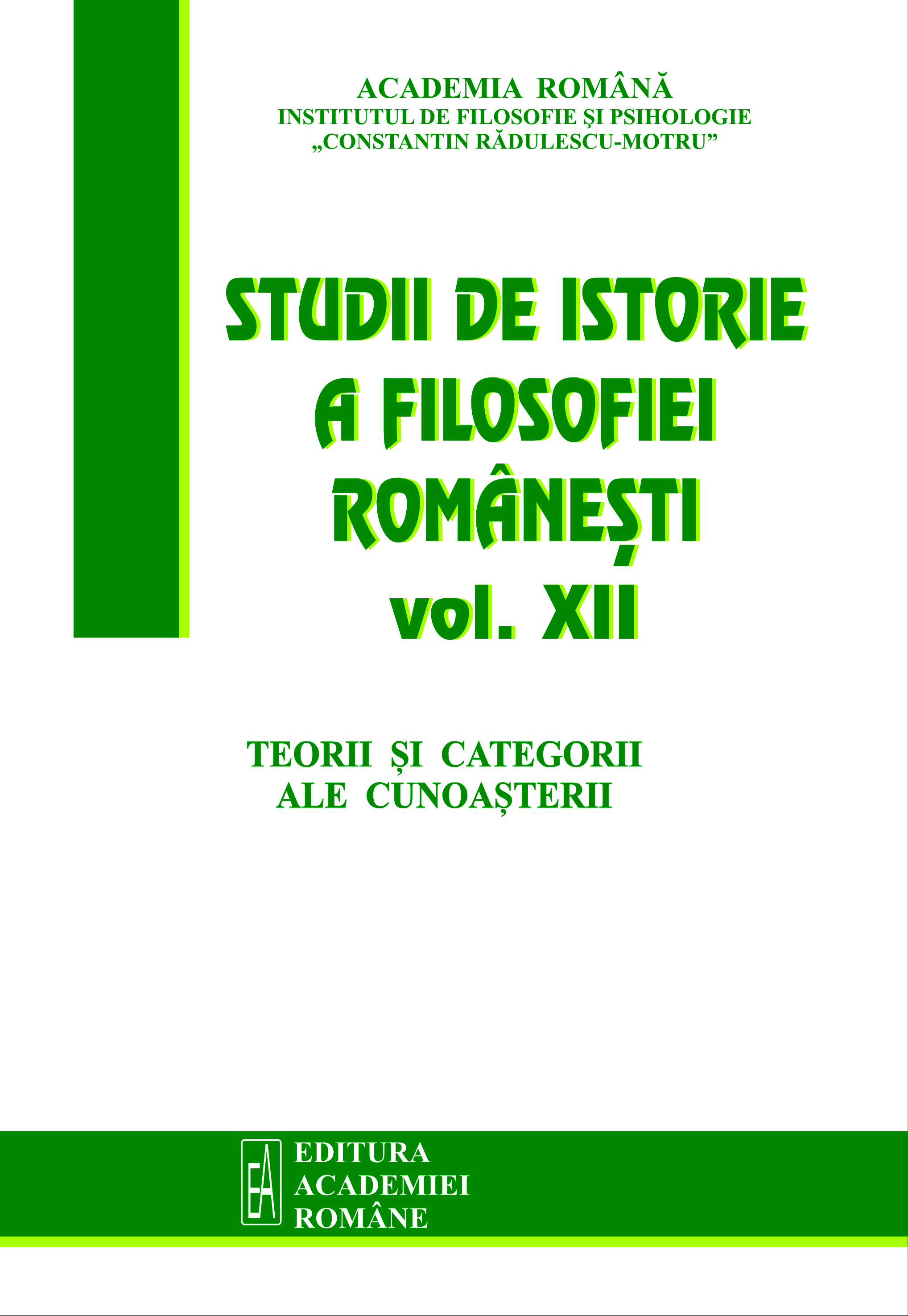
The following study is an examination of Lucian Blaga’s concept of “categories of the unconscious” or, in quasi-Kantian terms, the transcendental categories that belong to the subject in itself (“Subjekt an sich selbst”). These constitute a profound layer of the soul. The unconscious is not only a warehouse for the residues of conscious life, but rather an alter-ego of said consciousness, of whose contents we find out thanks to the phenomenon of “personance” (per-sounding). The study brings into discussion the way in which Blaga thinks we access the categories of the unconscious, which are, in turn, structured on two levels (or steps): a sensory one (sensations, perceptions, representations) and a thinking (noetic) one. The latter is composed of notions, judgments and inferences. Blaga speaks only of notions, especially of their various types that he calls “abyssal categories”.
More...
After conceptually integrating the theme of the article, from a theoretical and historical perspective, the author makes a significantly deep foray into Lucian Blaga’s stylistic metaphor as well as metaphysical concept of the “descending transcendence” or “sophianic transcendence”. It appears in The Trilogy of Culture, more precisely in The Mioritic Space and refers to the “psychology of the unconscious”, in which the stylistic phenomenon has its own categories, created as “abyssal noology”. The metaphysical significance of the descending transcendent corresponds to a meaning, stylistically and culturally interpreted – that of the Divine Logos –, specific to Byzantine architecture, with direct reference to Hagia Sophia, the cosmopolitan cathedral. Here, the Logos materializes as light descending in the concrete world, “an unearthly light, which appears invading the sanctuary coming from top to bottom, a light of a more pronounced materiality than the ubiquitous day light”, in Blaga’s own words. The sophianic concept integrates stylistic determinants of Byzantine basilical architecture, as opposite to the Gothic one, for example, to which an ascending meaning of Logos will correspond. It will become a key concept of the Orthodoxy, a profound characterization of Christian spirituality, integrated in a stylistic analysis.
More...
The historian of philosophy Nicolae Bagdasar wrote an ample study (first edition, 1940; second edition, 1944) concerning the main epistemological concepts from Antiquity to the mid-20th century (naive logicism, scepticism, rationalism, empiricism, criticism, positivism, empirical critique, pragmatism, humanism, fictionalism, agnosticism, intuitionism, imperativism, absolutism and relativism), a body of work that he called The Theory of Knowledge. We aimed to examine it by means of some methodological paradigms that Mona Mamulea – a researcher at the “Constantin Rădulescu-Motru” Institute of Philosophy and Psychology of the Romanian Academy – coined and analysed
More...
The author attempts to open a way for researching a number of philosophical concepts from the perspective of the nonjudicative experience. Any knowledge has necessarily the form of a judgment and a constitution depending on its rules, but there are a few concepts – the absolute, the undetermined, the infinite, the unconditioned, the nothingness - whose origin is not the rules of judgment, but the nonjudicative experience. One of the most important ideas concerning the connection of these philosophical concepts with the nonjudicative experience is the difference between the negative predication and the negative judgment. This idea is applied in two philosophical contexts belonging to Constantin Noica and Mircea Florian.
More...
In 1925, Ion Petrovici published a paper on Henri Poincaré as a philosopher. He tried to argue that Poincaré was a scientist who understood that science isn’t free from philosophical presuppositions. Moreover, Poincaré developed a new vision of science based on the role played by the so-called conventions. My aim is to offer a philosophical interpretation of this conventionalist theory about science and to discuss the main contemporary approaches to it. I express my adherence to the interpretation that conventionalism is a tentative to find a third way in epistemology between empiricism and rationalism and that conventions, as relativized a priori judgments, are created freely by reason under the guidance of experience.
More...
Motru’s ontological system, which might be regarded in terms of a “neutral monism”, was intended to reconcile the general idea of Kant's apriorism with some of the results reached by physics and psychology in the early decades of the 20th century. I will argue that Motru’s hypothesis, although labelled by him as “realism”, could be described as a “phenomenal scientistic ontology” based on an understanding of metaphysics as a science of everything.
More...
The daimonic is linked to a psychology of creation. Which is the basic features of the daimonic type when compared to knowledge? The daimonic displays paradoxical traits and does not fit in the common frame of our knowledge pattern, for the “typical” act of knowledge is not contradictory. The daimonic seems irrational. I say “seems” because, in Goethe’s opinion, humanism is related to an elementary – which is not to say illogical – human nature that manifests itself not only in a latent state, but is positively creative. The elementary nature or the original phenomenon is poiesis.
More...
This paper analyses the way in which the conceptual apparatus of Mihai Șora’s ontology (e.g. the ontological model and the categories of knowledge proposed by this model) is applied to the social world. By the means of this inquiry I – in agreement with the perspective of the Romanian philosopher – aim to shed light on the manner in which the social reality gets constituted and what is the signification of the social action. In order to fulfil these goals I shall compare Șora’s approach with two other philosophical theories: one by Martin Buber, who, in his work Ich und Du (1923) discusses the relation I-You (Ich-Du) and the relation I-That One (Ich-Es) and the other by Alfred Schütz, who in his Der sinnhafte Aufbau der sozialen Welt (1932) puts forward one phenomenological doctrine that emphasizes the contrast between the personal relations subsumed to the category of ’We’ and the impersonal relationship described by ’Those’. Șora’s correspondent for these relations appears encapsulated by the couple to be (the entitative relation) vs. to have (the relation of possession). The concept of relation and that of interval are two of the most important notions that I address in my study. I shall also take use in another original concept by Șora that is the gift of encounter / the phenomenon of encounter which may be of interest for both the phenomenological analysis of reality and the phenomenology of life and the social world.
More...
In this paper we approach Eugeniu Sperantia’s contributions to the theory of knowledge, by focusing on the topic of skepticism. We first discuss Sperantia’s subjectivist theory of perception, showing that it fatally entails skepticism about the external world and other minds. Then we discuss Sperantia’s overcoming of the limits of his own theory of perception in the framework of an commonsensist epistemology inspired by Hamilton. Finally we emphasize the non-evidentialist features of Sperantia’s brand of foundationalism.
More...
In this study I try to clarify the definition, functions and constitution of the notion of “mystery” in Lucian Blaga’s metaphysical system. This concept is of great importance for the existential constitution of humans because it is a twofold concept. On the one hand, it has an epistemological meaning (or, as I name it in the text, a “factic” meaning). On the other hand, there is a more primordial and broad meaning of the mystery which denotes the existential constitution of man. My aim is to show that the factic meaning of mystery is founded in the existential meaning and to analyze the relations between them.
More...

The following article presents the life and work of Josip Moesiodax (1725–1800), a professor at the Princely Academies in Bucharest and Iasi in the latter part of the 18th century. Representative of the Enlightenment, Moesiodax encouraged the natural sciences and regarded the Neo-Aristotelianism that prevailed in the Balkan scholarship as the main source of stagnation of knowledge in the Ottoman Empire. He argued for the replacement of the Aristotelian metaphysics with mathematics as a basic discipline in school as well as for the simplification of scientific terminology. He is the author of Apology (1781) and Pedagogy (1779), two significant works of that age.
More...
The philosophical criticism is an important subject of research for the historian of philosophy in his attempt to identify the influences for a philosophical conception. Moreover, the philosophical criticism helps the historian to appreciate the immediate reception of a certain philosophical work. This paper presents some of the philosophical criticism addressed to Lucian Blaga’s philosophy. It shows the negative criticism and the general disproof of several Romanian philosophers and cultural personalities to Lucian Blaga’s philosophy.
More...
